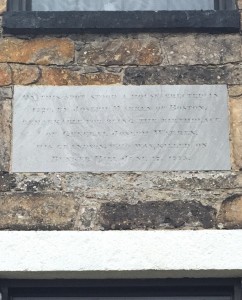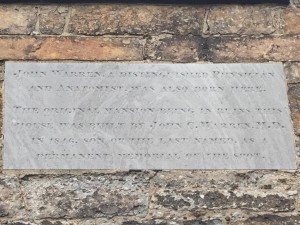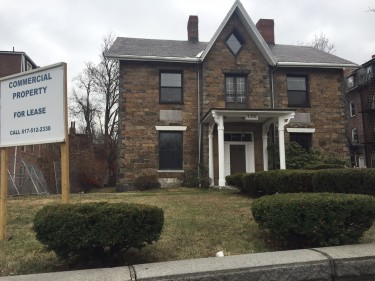Date: January 12, 2016
Commentary: The Warren House in Roxbury is currently unoccupied, unmarked as an historic site, and faces an uncertain future. The immediate neighboring structure recently burned due to accident or vandalism, and has been leveled to an empty lot.
The address is 130 Warren Street, Roxbury, MA 02119-3233. As of this writing, my call to the property’s owner or manager remains unanswered. I am unable to report on the offered lease terms, whether it is for sale, and whether provision is being implemented to recognize its historic value.
I have corresponded with a concerned citizen who is a resident of Roxbury. They point out unusual aspects of the site and current structure and asserts them worthy of designation as an historic site:
- The 17th and 18th century Warren farm is where the first commercial and uniquely American apple variety was bred. Variously called the Warren, Roxbury, and Boston Russet, American apple farming started right here during the Colonial era. Johnny Appleseed of history and legend came a century later and is erroneously credited with initiating American apple orchard cultivation.
- Birthplace and childhood home of Dr. Joseph Warren, an American Founder, and his brother Dr. John Warren (1753-1815), notable Boston physician and founder of Harvard Medical School.
- The current structure is a ‘habitable monument,’ one intended at is construction 170 years ago to mark an important location, set on the same footing as the predecessor derelict structure, but to be lived in and used. This characteristic is unique among monuments of national or regional significance.
- The Warren House is one of the few intact, all-puddingstone structures in Massachusetts. Puddingstone is literally the land of Roxbury. The builder’s intention of use by the living provides testament to the story of the land just as much as of its people.
The site and its structure are of historical significance to the neighborhood, to the City of Boston, to Massachusetts, and to the United States. It is the birthplace and home through adolescence of an American Founding figure. We recall that Joseph Warren:
- Valued his Roxbury roots. He was a student and later a teacher at Roxbury Latin School
- Performed key services to the City of Boston. Among other things he was the official physician to the poor; was a founding member of the Committee of Correspondence; agitated as one of the most radical of the Sons of Liberty; some say was the stage manager of the Boston Tea Party; and authored the foundational Suffolk Resolves.
- Was the de facto Governor of Massachusetts at the outset of the Revolutionary War. He was president pro tem of the Massachusetts Provincial Congress.
- Dispatched Paul Revere on the iconic Midnight Ride; directed the Siege of Boston in its earliest phase; and was recognized posthumously as a U.S. Continental Army Major General for heroics at Bunker Hill. He has long been considered an American military hero of national significance.
Dr. John Collins Warren (I, 1778-1856) succinctly told the story of the Warren House with inscriptions in stone set into the front wall. Facing the building, the stone set to the left reads:
 Inscribed stone in front wall of the Warren House in Roxbury MA
Inscribed stone in front wall of the Warren House in Roxbury MA
“On this spot stood a house erected in 1729, by Joseph Warren of Boston, remarkable for being the birthplace of General Joseph Warren, his grandson, who was killed on Bunker Hill, June 17, 1775.”
The stone inset on the right reads:
 A second inscribed stone in front wall of the Warren House in Roxbury MA
A second inscribed stone in front wall of the Warren House in Roxbury MA
“John Warren, a distinguished Physician and Anatomist, was also born here. The original mansion being in ruins, this house was built by John C. Warren, M.D. in 1846, son of the last named, as a permanent memorial of the spot.”
The run-on sentences and subordinate clauses are typical of writing of the early 19th century in general and of the imposing Victorian physician in particular. Nephew of the Revolutionary War hero Joseph Warren (1741-1775), John Collins Warren is best known for co-founding Massachusetts General Hospital and for his enabling of the introduction of surgical anesthesia in MGH’s Ether Dome.
Photo Source: Pictures taken by Samuel A. Forman on January 8, 2016.

 Follow
Follow